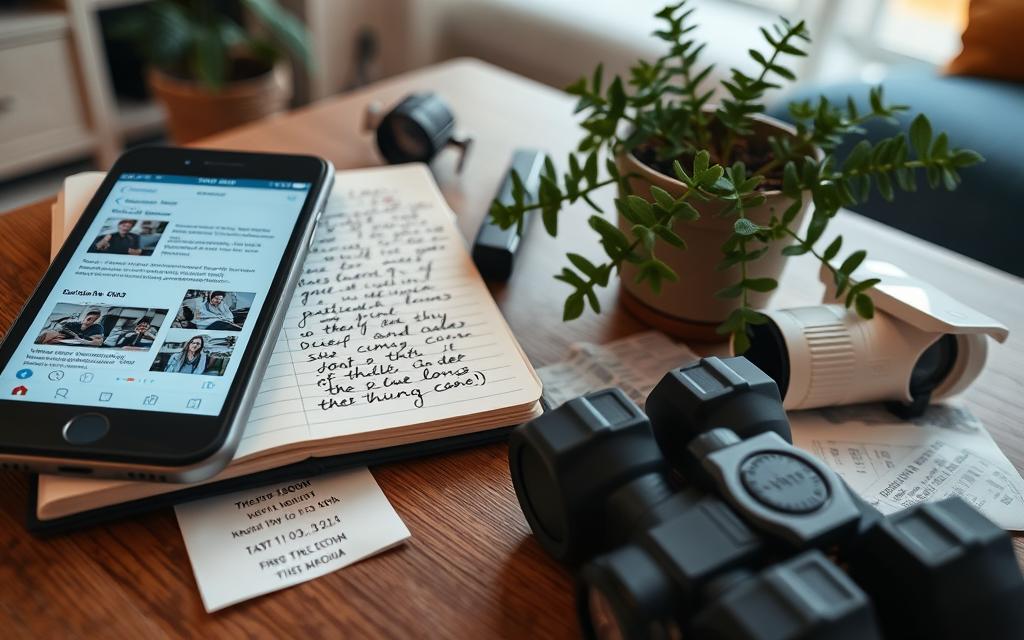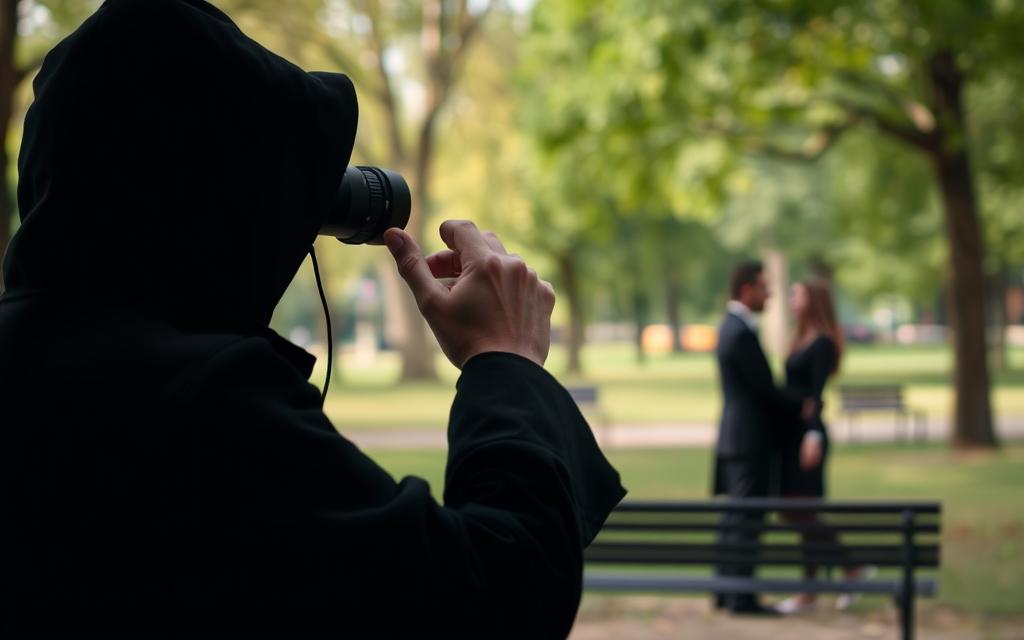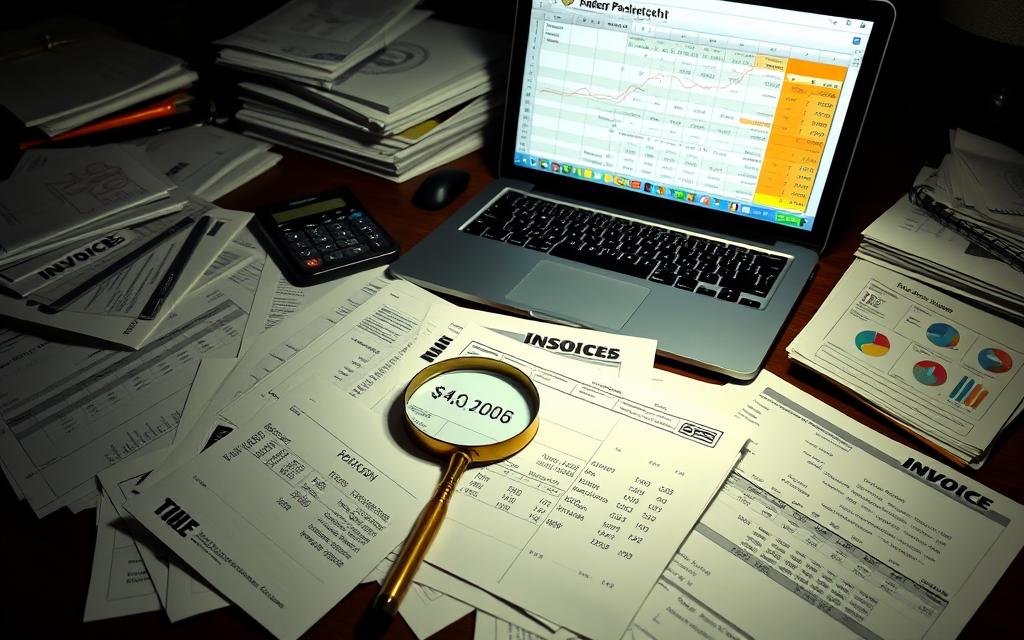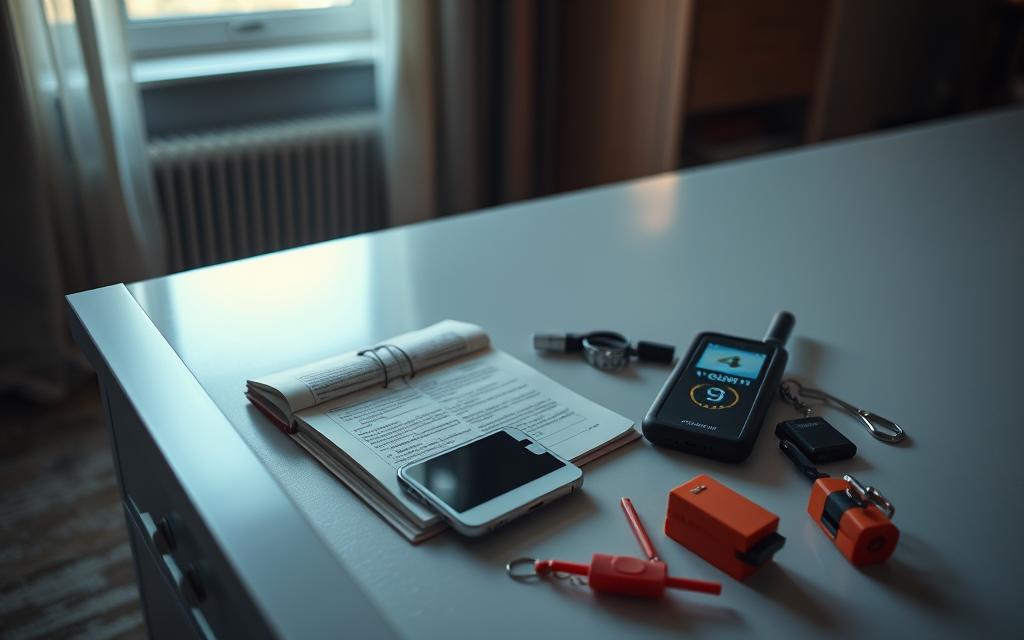Is your partner’s behavior making you think they might be cheating? Finding out your spouse is cheating is very hard. But knowing what to do and using the right tools can help you find out the truth. This guide will cover the signs of cheating, how to gather evidence, and legal things to consider when tracking a cheating partner.
Ever felt unsure if your partner is being faithful, leaving you with more questions? Feeling like your partner might be cheating can hurt your feelings and make you doubt the relationship. But don’t worry, this guide will give you the tools to deal with this tough situation and take back control of your relationship.
Understanding the Signs of Infidelity
Finding out if someone is cheating can be hard. Paying attention to common signs and changes in their behavior can help. Trusting your gut is key, but these signs don’t prove anything for sure. It’s important to keep an open mind and gather more facts before making any conclusions.
Common Red Flags to Watch For
- Increased secrecy and evasiveness regarding phone or computer use
- Emotional distance and decreased intimacy in the relationship
- Unexplained absences or changes in daily routine
- Sudden interest in improving physical appearance or grooming habits
- Defensive or argumentative behavior when questioned about changes
Emotional and Behavioral Changes
Infidelity can cause big changes in a person. They might not want to do things together anymore. They could also seem less interested in what you’re doing or get really upset easily.
They might also not want to have sex as much or be really worried about your schedule. These could be signs of cheating.
Changes in Communication Patterns
Changes in how they talk to you can also be a sign. If they’re really protective of their phone or secretive on social media, it could mean something. If they don’t want to share their thoughts or feelings, it’s another red flag.
Even if these signs make you suspicious, they don’t prove anything for sure. It’s important to talk openly with your partner and seek help if you need it. This way, you can handle the situation with care and understanding.
Why Evidence Gathering is Essential
Gathering evidence before talking to a partner about cheating is key. It makes sure concerns are based on facts. This leads to better conversations and stops gaslighting or denial. Evidence is also important in legal or relationship proceedings that might happen next.
Private investigators in matrimonial cases have a lot of experience. They use digital forensics to check electronic devices and social media for evidence. They give detailed reports with photographs, video footage, and written records. These can be very important in showing cheating.

In Texas, you need ‘clear and convincing’ evidence to prove cheating. This means you can document suspicious activities and keep records of phone calls. You can also get witness statements. Private investigators can watch without being seen, keeping the evidence safe.
Digital Surveillance Methods
In today’s world, couples might use digital tools to check on their partner’s activities. These methods can show if someone is being unfaithful online. But, it’s important to use them right and know the law.
Social Media Monitoring Techniques
Watching a partner’s social media can tell you a lot. Surveillance techniques like looking at their posts and friends can show if there’s a problem. But, it’s key to respect their privacy and trust in the relationship.
Phone and Message Tracking Tools
Looking at a partner’s phone or messages can give you clues about their actions. Mobile spy apps like Mspy and Spynger can track calls, texts, and even where they are. But, make sure you’re using these tools legally and ethically.
Email and Browser History Analysis
Checking a partner’s email and web history can also give you clues. Looking at their emails and web searches might show if they’re being unfaithful. But, be careful not to cross privacy lines.
While digital surveillance methods can be helpful, think about the ethics and laws first. Keeping trust, talking openly, and respecting each other should always be the main goal.
Tips for Tracking a Cheating Partner
Figuring out if your partner is cheating can be tough. But, there are ways to find out without being too invasive. Here are some tips for tracking a cheating partner and catching a cheater:
- Start with a talk: Be kind and open with your partner. Share your worries and listen to what they say.
- Trust your gut: If you feel something’s off, pay attention. Watch how your partner acts for any changes.
- Keep an eye on social media: Notice if your partner’s social media use changes suddenly. Look for new accounts or logouts.
- Ask about tracking: If your partner agrees, you can look into GPS tracking to see where they go.
- Check financial records: Look over phone bills, bank statements, and credit card records. Watch for anything strange or unexplained.
It’s important to handle this situation with care. Focus on talking openly and keeping trust in your relationship. Avoid using methods that are too invasive or hurtful.

By using these tips for tracking a cheating partner and staying calm, you can get the facts you need. This will help you decide what to do next in your relationship.
Physical Surveillance Strategies
Tracking a cheating partner can be done through physical surveillance. This means watching your partner’s actions without being seen. You might visit their workplace without telling them or notice changes in their daily routine.
But, you must be careful not to raise suspicion. Having a good reason for your visits is key to avoid being accused wrongly.
Maintaining Discretion During Observation
Being discreet is crucial when you’re watching someone. Try to blend in and avoid drawing attention. You might use disguises to hide your identity. Also, be careful with your body language to not look suspicious.
Documentation Methods
It’s important to document everything you see. Write down the time, where you were, and what you saw. You can take photos or videos, or just make notes. These can be useful if you need to prove something later.
But, always follow the law when you’re gathering evidence. It’s also wise to talk to a family law attorney. They can help you understand the legal side of surveillance and make sure you’re doing it right.
Professional Investigation Services
When all else fails, getting a private investigator might be the last resort. They are experts at finding the truth about a cheating partner. They use surveillance and gather solid evidence like photos or videos.
But, this step should be taken with care. It can make things worse in your relationship. Private investigators use many methods to find evidence, including:
- Digital Surveillance: They watch emails, social media, and phone use for cheating signs.
- Physical Observation: They quietly follow your partner to see where they go and what they do.
- Background Investigations: They do deep searches to find any past wrongdoings.
- Asset Searches: They look for hidden money clues that might show cheating.
Working with a trusted private investigator services can help you understand your partner better. It’s key to be careful with this step. The results can greatly affect your relationship.

Deciding to hire a private investigator should be a careful choice. It’s about weighing the benefits of knowing the truth against the risks to your relationship. With the right help, this step can help clear up cheating suspicions.
Legal Considerations When Tracking
When you think your partner might be cheating, knowing the law is key. It’s important to respect privacy and follow legal rules for gathering evidence. This way, any evidence you find can be used in court if needed.
Privacy Laws and Boundaries
Watching your partner secretly or checking their messages without permission can get you in trouble. You could face invasion of privacy charges. It’s vital to know the privacy laws in your area and act within them. Getting legal advice can help you understand the law and act responsibly.
Admissible Evidence Guidelines
When you’re looking for proof of cheating, you must follow admissible evidence guidelines. This means getting the right documents and keeping evidence safe. A lawyer can guide you through this to make sure your evidence is good to use in court.
Knowing the law and following the right steps helps protect you while you gather evidence. This careful approach can give you the answers you need about your relationship. It’s a way to find clarity and closure in a tough time.
Remember, using tracking legally and ethically is crucial. Getting professional advice ensures your actions are lawful and protect your rights.
For more on this, check out this article on the legal and ethical side of tracking a cheating spouse.
Financial Trail Investigation
Looking into your partner’s financial records can show important signs of infidelity. Things like unexplained expenses, suspicious withdrawals, or unknown credit card charges for gifts or trips are red flags. It’s key to understand your shared finances when detecting infidelity signs and gathering evidence.
When you find financial discrepancies, talk about it gently. Focus on the health of your relationship, not making accusations. This careful conversation can give you insights without hurting trust. By checking bank statements, credit card bills, and other financial documents, you might find patterns that show your partner’s betrayal.
- Look for unusual or unaccounted-for expenses, such as frequent dining out, hotel stays, or gift purchases.
- Check for unexplained cash withdrawals or transfers to unfamiliar accounts.
- Scrutinize credit card statements for charges at locations or establishments that don’t align with your partner’s typical spending habits.
- Monitor for any sudden changes in your partner’s spending patterns or financial management.
Collecting this financial evidence is a key step in detecting infidelity signs and building a case for further investigation. Be sensitive when discussing financial matters. By being vigilant and open-minded, you can find important clues that help clarify things and guide your next steps.

Building a Support Network
When you suspect your partner might be cheating, having a strong support network is key. Look for trusted friends or family who can offer emotional support and advice. Talking to those you trust can help you deal with the tough feelings and choices you’re facing.
Finding Trusted Confidants
Find people in your life who will listen without judging. These could be close friends, family, or even a spiritual advisor. Pick individuals who will keep your secrets and let you share your feelings safely.
Professional Counseling Options
- Also, think about getting help from a professional like a therapist or counselor.
- A therapist can guide you through your feelings and help you make decisions.
- Professional counseling offers a fresh view and teaches you ways to cope with the situation.
You don’t have to face this alone. Having both personal and professional support can be a big help as you go through suspected infidelity.
Confrontation Strategies
Choosing the right time to talk to your partner is key. Make sure you’re both in a quiet place without distractions. Stay calm and use “I” statements to share your feelings. This way, you avoid blaming and encourage honest talk.
Before you talk, gather solid proof of cheating. Use apps like Spynger or Moniterro to keep an eye on your partner’s phone. A study showed that 71% of people catch cheaters by using these apps.
- Find a private spot for the talk, with enough time for a detailed conversation.
- Begin by sharing your feelings and the evidence you have of cheating.
- Listen carefully to what your partner says and be ready for a real conversation.
The aim is to create a space for honest talk and to tackle cheating issues together. By using these steps, you can have a meaningful conversation and maybe even find a way to move forward.
Recovery and Healing Process
Dealing with infidelity in a relationship is tough and emotional. But, with determination and the right help, healing is possible. It involves dealing with emotional pain, getting professional advice, and choosing to rebuild trust or move on.
Emotional Healing Steps
The healing process after infidelity is like going through grief. It’s important for the hurt partner to share their feelings in a healthy way. This can be through writing, counseling, or talking to friends.
This helps them deal with their emotions, from anger and hurt to sadness and forgiveness.
Moving Forward Options
Couples have two main choices after infidelity: rebuilding the relationship through forgiveness and therapy, or letting go for their own well-being. The choice depends on the emotional damage, both partners’ effort, and the chance for a strong reconciliation.
The Trust Revival Method by Drs. John and Julie Gottman offers a way to regain trust. It has three stages: Atonement, Attunement, and Attachment. Therapy for both is key to healing from infidelity and recovering the relationship.
The journey to healing from infidelity and relationship recovery is personal. It needs patience, openness, and a desire to fix the trust issues. With the right support and a commitment to grow, couples can come out stronger.
Protecting Yourself During Investigation
When you start to investigate if your partner is being unfaithful, keeping yourself safe is key. This situation can be very emotionally tough. It’s important to stay calm and protect yourself as you gather information.
Keeping things private is a big part of staying safe. Don’t accuse your partner without proof, as this could make things worse. Hiring a professional private investigator can help. They know how to find out the truth without causing trouble.
- Set clear boundaries and limits on the investigation process to safeguard your emotional well-being.
- Seek support from trusted confidants or a professional counselor to help you navigate the emotional challenges.
- Be mindful of your own safety, and avoid putting yourself in potentially dangerous situations during the investigation.
Keeping yourself safe and emotionally sound is crucial during this time. By being discreet, setting limits, and getting support, you can handle the investigation well. This way, you can focus on your own well-being.

Conclusion
Tracking a cheating partner can give you insights, but the main goal is to make smart choices about your relationship. It’s important to think about your own emotional health too. Remember, over 50% of relationships face infidelity, but it’s key to handle it with care and understanding.
Spotting red flags like changes in routine or secrecy can help you suspect cheating. But, it’s vital to respect your partner’s privacy and keep trust alive. If you do decide to gather evidence, do it with caution, thinking about the legal side and how it might affect you.
Choosing to talk to your partner about cheating or getting help from experts is a personal decision. Building a strong support network and focusing on self-care can help you through this tough time. Whether you choose to stay together or move on, your well-being is the most important thing. Healing and moving forward might be hard, but it’s worth it for your happiness and safety in future relationships.
